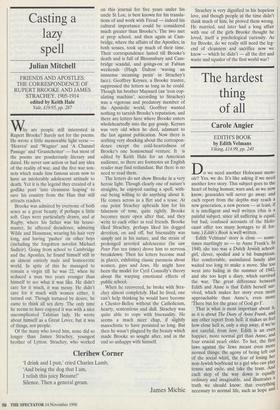Casting a lazy spell
Julian Mitchell
FRIENDS AND APOSTLES: THE CORRESPONDENCE OF RUPERT BROOKE AND JAMES STRACHEY, 1905-1914 edited by Keith Hale Yale, £19.95, pp. 287 by are people still interested in Rupert Brooke? Surely not for the poems. He wrote a little memorable light verse 'Heaven' and 'Wagner' and 'A Channel Passage' and `Grantchester' — but most of the poems are ponderously literary and dated. He never saw action or had any idea of the reality of war, and the five war son- nets which made him famous seem now to have an intolerably adolescent attitude to death. Yet it is the legend they created of a godlike poet 'into cleanness leaping' to save his country from the Hun that still attracts readers.
Brooke was admired by everyone of both sexes as a great beauty, if perhaps a little soft. Gays were particularly drawn, and at Rugby, where his father was his house- master, he affected decadence, admiring Wilde and Housman, wearing his hair very long, and having `pashes' on other boys (including the forgotten novelist Michael Sadleir). Going from school to Cambridge and the Apostles, he found himself still in an almost entirely male and homoerotic world. In spite of this he managed to remain a virgin till he was 22, when he seduced a man two years younger than himself to see what it was like. He didn't care for it much, it was messy. He didn't care for it much with women either, it turned out. Though tortured by desire, he came to think all sex dirty. The only time he seems to have enjoyed it was with a nice uncomplicated Tahitian lady. He wrote about himself as a Great Lover, but it was of things, not people.
Of the many who loved him, none did so longer than James Strachey, youngest brother of Lytton. Strachey, who worked on this journal for five years under his uncle St Loe, is best known for his transla- tions of and work with Freud — indeed his cultural importance could be considered much greater than Brooke's. The two met at prep school, and then again at Cam- bridge, where the affairs of the Apostles, in both senses, took up much of their time. Their correspondence lasted till Brooke's death and is full of Bloomsbury and Cam- bridge scandal, and goings-on at Fabian weekends (Hugh Dalton 'waving an immense steaming penis' in Strachey's face). Geoffrey Keynes, a Brooke trustee, suppressed the letters as long as he could. Though his brother Maynard (an 'iron cop- ulating machine', according to Strachey) was a vigorous and predatory member of the Apostolic world, Geoffrey wanted nothing to tarnish Brooke's reputation, and there are letters here where Brooke enters wholeheartedly into the gay gossip. Keynes was very old when he died, adamant to the last against publication. Now there is nothing very shocking about the correspon- dence except the cold-heartedness of Brooke's one homosexual venture. It is edited by Keith Hale for an American audience, so there are footnotes an English reader may find redundant. But there is no need to read them.
The letters do not show Brooke in a very heroic light. Though clearly one of nature's straights, he enjoyed casting a spell, with- out being willing to do anything about it. He comes across as a flirt and a tease. At one point Strachey upbraids him for his falseness of tone, quite rightly. Brooke becomes more open after that, and they write to each other as real friends. Brooke liked Strachey, perhaps liked his dogged devotion, on and off, but bisexuality was simply not in his nature, and the strain of prolonged arrested adolescence (he saw Peter Pan ten times) drove him to nervous breakdown. Then his letters become mad in places, exhibiting classic paranoia about women, gays and Jews. He might have been the model for Cyril Connolly's theory about the warping emotional effects of public school.
When he recovered, he broke with Stra- chey almost completely. Had he lived, one can't help thinking he would have become a Chester-Belloc without the Catholicism, hearty, sententious and dull. Strachey was quite able to cope with bisexuality. He seems a much nicer chap, if slightly masochistic to have persisted so long. But then he wasn't plagued by the beauty which made Brooke so sought after, and in the end so unhappy with himself. Strachey is very dignified in his hopeless love, and though people at the time didn't think much of him, he proved them wrong. He married, and later had a long affair with one of the girls Brooke thought he loved, itself a psychological curiosity. As for Brooke, do we really still need the leg- end of cleanness and sacrifice now we know — which he didn't — all the dirt and waste and squalor of the first world war?


















































































 Previous page
Previous page